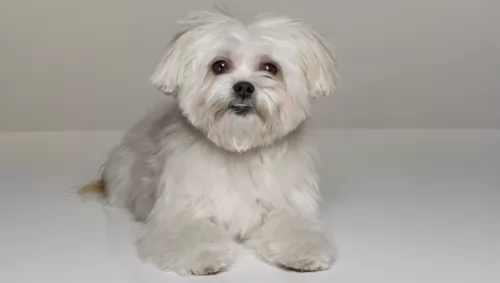 Petzlover
Petzlover Biewer is originated from Germany but Kyi-Leo is originated from United States. Biewer may grow 8 cm / 3 inches shorter than Kyi-Leo. Both Biewer and Kyi-Leo are having almost same weight. Both Biewer and Kyi-Leo has same life span. Biewer may have less litter size than Kyi-Leo. Biewer requires High Maintenance. But Kyi-Leo requires Moderate Maintenance
Biewer is originated from Germany but Kyi-Leo is originated from United States. Biewer may grow 8 cm / 3 inches shorter than Kyi-Leo. Both Biewer and Kyi-Leo are having almost same weight. Both Biewer and Kyi-Leo has same life span. Biewer may have less litter size than Kyi-Leo. Biewer requires High Maintenance. But Kyi-Leo requires Moderate Maintenance
 The Biewer is, or was, a piebald Yorkie caused by a recessive gene in a breeding of two Yorkshire Terriers. On Jan 20, 1984 a piebald Yorkshire puppy was born in Hunsruck, Germany to Gertrud and Werner Biewer. The puppy was considered beautiful and the Biewer’s fell in love with it and began a process od selective breeding in an effort to breed piebald Yorkies. Based on a friend’s suggestion, they named this group of puppies, “Biewer Yorkshire Terrier a la Pom Pon”. By 1989 the Allgemeiner Club der Hundefreunde Deurschland (ACH) officially recognized the Biewer Yorkie as a separate breed. Today they are recognized world wide as two separate breeds.
The Biewer is, or was, a piebald Yorkie caused by a recessive gene in a breeding of two Yorkshire Terriers. On Jan 20, 1984 a piebald Yorkshire puppy was born in Hunsruck, Germany to Gertrud and Werner Biewer. The puppy was considered beautiful and the Biewer’s fell in love with it and began a process od selective breeding in an effort to breed piebald Yorkies. Based on a friend’s suggestion, they named this group of puppies, “Biewer Yorkshire Terrier a la Pom Pon”. By 1989 the Allgemeiner Club der Hundefreunde Deurschland (ACH) officially recognized the Biewer Yorkie as a separate breed. Today they are recognized world wide as two separate breeds.
Today there have been genetic studies done that have declared the Biewer Terrier to be a separate and distinct breed from the Yorkshire Terrier, not simply tricolored Yorkies. The BTCA (Biewer Terrier Club of America) changed the name and standard to an original one for the Biewer Terrier. Mrs. Biewer has accepted and signed this revised standard and it is the only one she has accepted. This new standard allows the Biewer Terrier to have a black coat and an undocked tail. In 2014 with the new standard the American Kennel Club Foundation Stock Service (ACK/FSS) accepted the Biewer Terrier. Some breeders still want the breed called the Biewer Yorkshire a la Pom Pon, but Mrs. Biewer has objected to this, insisting the dog is a terrier. The Biewer Breed Club of America (BBCA) insists on the breeding of Biewers only to other Biewers. This is opposed by others who are importing Biewers and breeding them with Yorkies. The result is not recognized as a purebred dog. BBCA breeders do not engage in this type of cross breeding or condone them. The BBCA breeds only dogs that meet the standard set by the BTCA.
The first two Biewers were imported to the States in 2003 by Donna Hall. They made history in 2003, when they were accepted by the IABCA (International All Breed Canine Association) and entered their first dog show. Today they are shown in rare breed dog shows around the world. Today there are two standards in operation for the Biewer as the American Biewer and the North American Kennel Club continue to follow the German standard while the BBCA follow the revised standard approved by Mrs. Biewer.
 The Kyi-Leo first came about in the 1950s in San Francisco, USA, with the crossing of two dog breeds – the Lhasa Apso and the Maltese.
The Kyi-Leo first came about in the 1950s in San Francisco, USA, with the crossing of two dog breeds – the Lhasa Apso and the Maltese.
Because this is a mixed-breed dog, it isn’t recognized by the American Kennel Club, but it is recognized by some of the other dog associations such as the American Rare Breed Association or ARBA as it is known. Today the dog is looked upon as a designer breed.
 This long-haired terrier is a neat and compact toy dog. Their hair should be as long as their body is high and hang straight from the bottom of his skull to the end of his tail which is carried upward. He is a well proportioned and powerful little dog. He has no undercoat, but his overcoat is very much like human hair and should be combed. The head is a signature of the Biewer, covered with symmetrical gold, white and blue/black hair. They have flat, small heads and a black nose with an average muzzle. They have intelligent, dark, medium sized eyes and small ears shaped as a V and standing erect. All four legs are straight, and the hips are well formed. They have round feet and an undocked tail.
This long-haired terrier is a neat and compact toy dog. Their hair should be as long as their body is high and hang straight from the bottom of his skull to the end of his tail which is carried upward. He is a well proportioned and powerful little dog. He has no undercoat, but his overcoat is very much like human hair and should be combed. The head is a signature of the Biewer, covered with symmetrical gold, white and blue/black hair. They have flat, small heads and a black nose with an average muzzle. They have intelligent, dark, medium sized eyes and small ears shaped as a V and standing erect. All four legs are straight, and the hips are well formed. They have round feet and an undocked tail.
 The Kyi-Leo is a small dog standing at 20 – 30cm in height and weighing in the region of 4 – 6kg.
The Kyi-Leo is a small dog standing at 20 – 30cm in height and weighing in the region of 4 – 6kg.
He has a long, silky coat which is essentially black and white or grey/silver and white or even gold and white. He has frail legs which can become injured or broken in vigorous rough and tumble games.
You can certainly describe the Kyi-Leo as a sweet, quiet, non-aggessive playful dog, and for anyone who wants a splendid pet and companion, this dog makes a great family pet and he won’t cost you an arm and a leg to feed either.
He also has an acute sense of hearing and this turns him into an excellent ‘alarm’ watch-dog. It is also a dog, that while he will love to join you on a walk, he isn’t a dog that is going to demand a lot of exercise.
He responds well to his human family, is easy-going and gentle, tending to be cautious around strangers. You can trust him to be an awesome playmate for children. In this instance, it’s the children who should be warned when playing with a dog like this as, because of his fragile build, he could easily be injured by children who haven’t been taught to respect animals.
Even though he is such an amicable pet, it will still be of benefit to you and him to have him trained and socialized. Then he responds well to basic commands such as sit, stay and lie-down.
Dogs who spend time with their family, pick up on the ‘culture’ of the family and they learn how to behave. Dogs who are left on their own and never socialized can become nervous and aggressive towards people as they never got to learn how to behave – they weren’t socialized.
 The Biewer Terrier loves to be loved and he returns it in volumes. This is a dedicated, fun loving and charming little dog that you can carry around. They are loyal and friendly, athletic and alert. They are barkers when they need to be, but they are not “yappy dogs”. They love toys so make sure they have plenty. They will carry them wherever they go.
The Biewer Terrier loves to be loved and he returns it in volumes. This is a dedicated, fun loving and charming little dog that you can carry around. They are loyal and friendly, athletic and alert. They are barkers when they need to be, but they are not “yappy dogs”. They love toys so make sure they have plenty. They will carry them wherever they go.
 The Kyi-Leo is everything you want in a family companion – active, playful, loving, gentle, happy and balanced.
The Kyi-Leo is everything you want in a family companion – active, playful, loving, gentle, happy and balanced.
He loves his human family but tends to be a little bit wary around strangers, gradually warming to them.
He may be small, but he is robust and alert, and he is also capable of making you a good watchdog.
The Kyi-Leo is an all-round great little pet to have.
 The Biewer Terrier is not a cross breed or hybrid and so does have some of the very serious health issues of the Yorkshire Terrier including the bane of small dogs with liver shunts. Liver shunts are fatal if they are not treated. The breed does have sensitive stomach issues as well. They face other small dog issues like floating patella’s, ear and skin infections. Other than this the Biewer Terrier is a very healthy breed.
The Biewer Terrier is not a cross breed or hybrid and so does have some of the very serious health issues of the Yorkshire Terrier including the bane of small dogs with liver shunts. Liver shunts are fatal if they are not treated. The breed does have sensitive stomach issues as well. They face other small dog issues like floating patella’s, ear and skin infections. Other than this the Biewer Terrier is a very healthy breed.
 Your Kyi-Leo is such a feisty, robust little dog who is not likely to cost you much in terms of health care. With his frail legs, it is a good thing to know that you need to be careful with him in terms of back-and joint problems.
Your Kyi-Leo is such a feisty, robust little dog who is not likely to cost you much in terms of health care. With his frail legs, it is a good thing to know that you need to be careful with him in terms of back-and joint problems.
There are actually knee joint issues which are fairly common in small dogs, one of which is patellar luxation.
This is where the kneecap pops out of the thighbone, causing the dog to skip or hop. Some joint issues are genetic and may require surgery. Make sure to keep your pet’s weight under control to remove additional stress on the joints.
This is another dog illness you want to be careful with. Acute pancreatitis -inflammation - is when the condition comes on suddenly while chronic pancreatitis is when pancreatitis occurs over a period of time.
With acute pancreatitis in dogs you’ll see symptoms such as vomiting, abdominal pain, tremors and reluctance to eat. Pancreatitis can be brought on by too much fat, especially rancid fat, some anti-biotics, a low protein diet or a sickness such as diabetes.
If you suspect pancreatitis in your dog, get him as quickly as possible to the vet.
 As previously mentioned the Biewer Terrier has a very sensitive stomach and intestinal system. He should be fed low protein dry dog food. Watch for signs of food allergies such as scratching or chewing on his feet. Feed 2-3 times a day but the Biewer Terrier is one of the few dogs that you can safely free feed unless you notice substantial gaining of weight.
As previously mentioned the Biewer Terrier has a very sensitive stomach and intestinal system. He should be fed low protein dry dog food. Watch for signs of food allergies such as scratching or chewing on his feet. Feed 2-3 times a day but the Biewer Terrier is one of the few dogs that you can safely free feed unless you notice substantial gaining of weight.
Health issues are few as mentioned previously. However, make sure your Briewer’s ears are free of debris and wax, make sure their teeth are brushed and they show no signs of allergies. Along with liver shunts, sensitive intestinal and stomach issues and floating patellas, these are the other minor issues that might occur. Watch for diarrhea and off colored stools.
The Biewer Terrier is an active dog that needs regular exercise and walks. He is a speed demon as his ancestor the Yorkie is and needs an outlet for running as well as daily walks. They love to run, and they love to play. They do great in agility but love adventures. They are smart and love to learn tricks. Since they love hunting vermin they would also excel at Barn Hunt.
 The Kyi-Leo doesn’t require vigorous exercising. One walk a day will keep them happy. There are pet owners who believe dogs can be permanently outside dogs where they can do their own exercise.
The Kyi-Leo doesn’t require vigorous exercising. One walk a day will keep them happy. There are pet owners who believe dogs can be permanently outside dogs where they can do their own exercise.
Everybody who knows dogs, knows they are social creatures who will simply lie at your backdoor just waiting for some response from their beloved human family. Every dog, regardless of breed or size, needs exercise and interaction with their humans every day.
Dogs left alone in the yard day after day are loney, frustrated and bored, and when they start digging or barking, irresponsible owners will ill treat them. These kind of people should never own a dog.
The Kyi-Leo has a sensitive stomach so he’ll need good quality food to avoid digestive problems. Ideally home-cooked food such as softly boiled chicken, brown rice and raw or cooked vegetables added into top quality kibble is the preferred diet.
Fresh, cool water needs to be constantly available.
Brush the long, silky coat at least twice a week to ensure it remains free of knotting. Brushing keeps the coat shiny too.
As a long eared dog, ears should be checked and cleaned regularly too. Air doesn’t reach the inside of their ears and the warm dampness in the ears are a breeding place for infection.
Nails should also be trimmed when they become long because left uncut they can hook onto things causing injury ad pain.
Small dogs are more prone to tartar formation and loss of teeth. You’ll notice that something isn’t right because your lively little dog will be lethargic, he may not want to eat his food and his face may be swollen. When you suspect dental problems, get him to the vet.